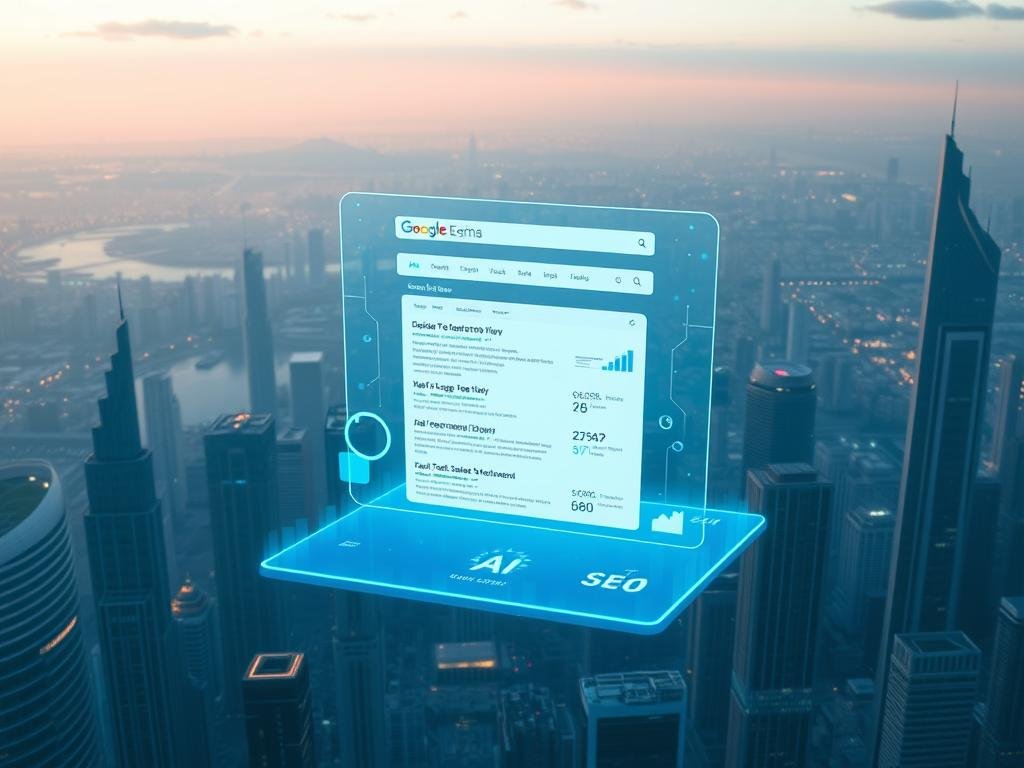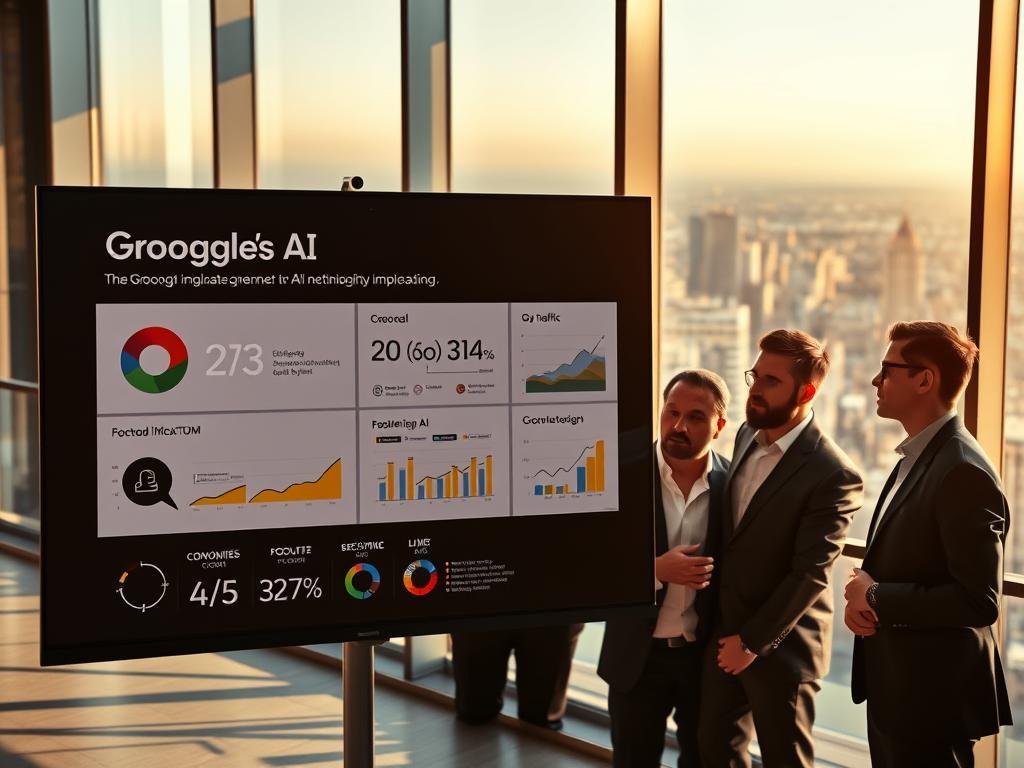A study by SparkToro found a surprising fact: over 58% of Google searches now result in zero clicks. This means most users find what they need without visiting external websites. The main reason for this is the growing use of AI-generated summaries in search results.
With AI Overviews becoming more common, content makers and businesses face a big challenge. They must adjust to this new reality. The effect on website traffic is huge, making them rethink their SEO plans.
Key Takeaways
- The rise of AI Overviews is changing the way users interact with search engine results.
- Over 58% of Google searches result in zero clicks.
- AI-generated summaries are becoming increasingly prevalent in SERPs.
- Content creators and businesses must adapt to the changing landscape.
- Traditional SEO strategies are being re-evaluated in light of AI Overviews.
The Rise of Google AI Overviews
Google’s AI Overviews are changing the game in search engines. They affect website traffic and SEO strategies. It’s key to grasp their impact on your online presence.
What Are Google AI Overviews?
Google AI Overviews are summaries made by AI that show up at the top of search results. They aim to give quick answers to questions. These summaries use advanced AI to pick out the most important info.
AI Overviews have made Google’s search better by giving users fast insights. For example, searching “climate change causes” might show a summary. This summary could cover the main points, like greenhouse gases and warming trends.
When and How They Were Introduced
Google launched AI Overviews as Search Generative Experience in May 2023. They’ve been growing, which has cut into organic traffic. A study by Semrush shows many sites have seen a drop in organic traffic.
The introduction of AI Overviews has been slow, with Google improving them over time. As AI Overviews get better, content creators need to adjust their strategies to stay visible.
Google’s Vision for AI in Search
Google wants to make search better with AI. They aim to give users more accurate and relevant info. This makes searching faster and easier.
- Improved Accuracy: AI algorithms make sure the info is right and relevant.
- Enhanced User Experience: AI Overviews give quick summaries, making search better for users.
- Future Developments: Google keeps working on AI Overviews, showing AI’s big role in search’s future.
As AI Overviews grow, it’s vital to understand their effect on your content strategy. Keeping up with these changes helps you adapt to the new SEO world.
Understanding How Google AI Overviews Work
Google AI Overviews are key for anyone wanting to boost their online presence. As Google’s search tech grows, AI Overviews play a big role in search results.
The Technology Behind AI Overviews
Google AI Overviews use a complex system. It involves many AI models working together to make summaries. This tech breaks down questions into smaller parts and searches them all at once.

How Content is Selected and Displayed
Choosing and showing content in AI Overviews is done by smart algorithms. These algorithms check if the content is relevant and good. Recent insights show how they pick the best info for users.
Differences from Featured Snippets and Knowledge Panels
AI Overviews are different from featured snippets and knowledge panels. Here’s a table showing the main differences:
| Feature | AI Overviews | Featured Snippets | Knowledge Panels |
|---|---|---|---|
| Purpose | Provide detailed summaries | Give quick answers to specific questions | Show detailed info on entities |
| Content Source | Many sources combined | One source picked | Info from various sources, including Knowledge Graph |
| User Interaction | Encourages exploring subtopics | Directly answers the question | Offers an overview with links for more info |
Knowing these differences helps you make your content better for Google AI Overviews. This can improve your online presence and how users interact with your site.
Initial Data: The Impact on Website Traffic
Google’s AI Overviews are changing, and it’s causing a big drop in website traffic. This is a big problem for businesses and content creators who need people to find them online.

Traffic Decline Statistics Across Industries
A study by Semrush looked at 10,000 keywords and found a big drop in clicks. AI Overviews are affecting many industries, not just a few.
The study showed a 10% to 30% drop in organic traffic. Some industries, like finance and healthcare, saw even bigger drops. This is because AI answers many questions directly, making websites less necessary.
Which Content Types Are Most Affected
Some content types are hit harder by AI Overviews. Informational content, like blog posts, is very affected. This is because AI gives direct answers, making clicks less needed.
Commercial and transactional content is also hit, but less so. E-commerce sites see changes based on their products and competition.
Case Studies of Major Traffic Shifts
Some big examples show how AI Overviews are changing traffic. A leading online publication lost 25% of its organic traffic after AI summaries were introduced.
An e-commerce site lost 15% of its traffic because AI was recommending products directly. These stories show the need for businesses to update their SEO strategies.
As we head into 2025, knowing about SEO changes will be key. By keeping up with these changes, businesses can stay ahead in the digital world.
The Transformation of Search Engine Results Pages
AI Overviews are changing search engine results pages (SERPs) a lot. You need to know these changes to update your website ranking strategies well.
Before vs. After AI Overviews
AI Overviews have changed how search results look. Before, users used the “ten blue links” to find what they needed. Now, AI summaries are how users interact with search results.
SEO used to focus on the “ten blue links.” Now, it’s about making content that goes well with AI summaries.

Changes in User Click Behavior
AI Overviews have changed how users click on search results. Many now get answers from AI summaries without clicking through. This change affects search engine optimization trends and website traffic a lot.
- Users find answers on the search results page more often.
- Many websites see fewer clicks.
- Content creators must change their strategies to stay relevant.
The Shrinking “Ten Blue Links” Paradigm
The “ten blue links” model is getting smaller with AI Overviews. You need to rethink your website ranking strategies to work with AI summaries.
To do well in this new world, consider these tips:
- Use structured data and schema markup for artificial intelligence in SEO.
- Create high-quality, informative content that fits with AI Overviews.
- Keep an eye on your website traffic and adjust your plans as needed.
By understanding the changes in SERPs and adjusting your strategies, you can stay strong online.
Google AI Overviews and SEO Changes for 2025
Google AI Overviews are changing SEO strategies for 2025. Content creators must adapt to AI’s growing role in search results. Understanding AI’s impact on SEO is key for businesses and creators.
What Industry Leaders Are Saying
Industry leaders are discussing Google AI Overviews’ effect on SEO. They say high-quality, authoritative content will be more important. Content must be informative, engaging, and trustworthy.
Rand Fishkin, a well-known SEO figure, believes content should connect with users deeply. It should meet their needs fully.
Predictions for Further Evolution
AI’s impact on SEO will grow as AI technology advances. Google’s algorithms will get smarter, changing content ranking and display. Adaptability and continuous learning are essential for SEO pros.
- Greater emphasis on user experience and engagement metrics
- Increased importance of E-A-T (Expertise, Authoritativeness, Trustworthiness) signals
- Potential for new content formats for AI-driven search results
Contrasting Viewpoints on Long-term Impact
Some see Google AI Overviews as a plus for user experience. Others worry about its impact on website traffic. The long-term effects are unclear, but SEO strategies must evolve.
A balanced approach is vital. Focus on both short-term adjustments and long-term planning. By staying informed and adaptable, businesses can thrive in the AI era.
Who Benefits from AI Search Impact?
Google’s AI Overviews are changing how we search online. It’s important to know who benefits from this change. AI-driven search results affect many people in different ways.
Google’s Business Perspective
Google sees AI Overviews as a big win for its business. They help keep users on Google longer, which means more ad views. AI Overviews give Google the chance to answer questions fully, making users happier and keeping them on the site longer. This leads to more ads being shown, which helps Google’s bottom line.
Google’s AI Overviews keep users engaged, which boosts ad revenue. For more on AI’s role in web development, check out Digital Vista Online.

User Experience Considerations
Users get a better search experience with AI Overviews. They get quick, detailed answers, saving time. AI Overviews are great for complex questions that need info from many places. They also help users find new content and ideas, making their search better.
Content Creators Who Are Thriving
Some content creators are doing well with AI Overviews. Those who make high-quality, engaging content are more likely to be seen. This can bring more visitors to their sites and grow their online fame. Creators who adjust their strategies to work with AI Overviews also see more success.
| Beneficiaries | Benefits |
|---|---|
| Increased ad revenue, user retention | |
| Users | Enhanced search experience, quick answers |
| Content Creators | Increased visibility, traffic |
The Most Vulnerable Content Categories
It’s key for businesses and content creators to know which types of content are most at risk from AI Overviews. As Google improves its AI-driven summaries, some content types are more likely to see changes in search results.
Informational Queries at Highest Risk
Informational queries are hit hard by Google AI Overviews. These are searches for quick answers to questions. AI Overviews often give direct answers, which might make users less likely to visit websites. This could cause a big drop in organic traffic loss for sites that used to get these searches.
To lessen this effect, content creators should work on a content strategy AI that works with AI Overviews. They might create more detailed content that offers more than just a quick answer. This way, users who want more info will find value in the content.
E-commerce and Transactional Content
E-commerce sites and transactional content face challenges too. While AI Overviews can bring traffic by showing products or services, they can also send users to competitors or Google’s shopping pages. The machine learning impact on SEO for e-commerce means product pages and transactional content need to be top-notch to stay seen.
Businesses should make sure their product listings are current and include schema markup to help Google get their content. Keeping up with Google algorithm updates and adjusting SEO strategies can also help e-commerce sites stay visible.
Local Business Impact Assessment
Local businesses could also see big changes from AI Overviews. As these summaries become more common, local businesses might see how they’re shown in search results change. This could impact their visibility, foot traffic, and sales.
To fight this, local businesses should focus on having a strong online presence. This includes accurate Google My Business listings and other directories. They should also create content that speaks to their local audience, boosting their local SEO efforts.
Adapting Your Content Strategy for the AI Era
AI is changing how we search, and your content strategy needs to keep up. Google AI Overviews are altering how users see search results. Content creators must adapt to stay relevant.
Creating Content That Complements AI Overviews
To succeed, focus on content that works well with AI Overviews, not against them. Create high-quality, authoritative content that adds value beyond AI summaries.
- Develop in-depth guides that offer detailed insights into complex topics.
- Create resources that cover all aspects of a subject.
- Use formats like videos, infographics, and interactive content to improve user experience.
For more tips on optimizing content for AI-driven search, check out AI SEO. Stay updated on the latest trends and strategies.
Focusing on User Intent Beyond Simple Answers
Understanding user intent is key in the AI era. It’s not just about quick answers. It’s about meeting the user’s deeper needs and questions.
- Analyze search queries to grasp the context and intent.
- Create content for all stages of the user’s journey.
- Use long-tail keywords to target specific intents more effectively.
Developing Expertise, Authority, and Trust Signals
It’s important to make your content trustworthy. Show expertise, build authority, and show trustworthiness.
| Signal | Description | Example |
|---|---|---|
| Expertise | Showcase knowledge and credentials | Author bios with relevant qualifications |
| Authority | Build reputation through citations and backlinks | Getting referenced by reputable sources |
| Trustworthiness | Ensure transparency and accuracy | Clear sources, fact-checking |
By focusing on these areas, you can create a content strategy that thrives in the AI era. Your content will stay relevant and valuable to your audience.
Technical SEO Adjustments to Combat Website Traffic Decline
AI-driven search results are now the standard. To keep your website traffic up, you need to update your technical SEO. Google’s AI Overviews are getting smarter, so it’s key to make technical changes to stay seen and relevant.
Schema Markup and Structured Data Importance
Schema markup and structured data are key for AI crawlers to get your content. By adding schema markup, you give search engines more context. This can boost your chances of showing up in AI Overviews.
- Use schema markup to highlight key information such as reviews, events, and business hours.
- Implement structured data to help search engines understand your content’s context and relevance.
- Ensure your schema markup is accurate and up-to-date to avoid any penalties.
According to recent insights, schema markup is very important. It directly affects how your content shows up in AI-driven search results.
Page Experience Metrics That Matter
Page experience metrics are now key for Google AI Overviews. Making sure your website is easy to use is essential for keeping traffic.
- Work on making your pages load faster to keep users engaged.
- Make sure your website works well on mobile devices, as most traffic comes from mobile.
- Keep your website’s navigation simple and straightforward to help visitors find what they need.
Content Organization for AI Crawlers
It’s important to organize your content so AI crawlers can understand it. Use clear headings, short paragraphs, and relevant links.
Best practices include:
- Use clear and descriptive headings that match your content.
- Break up long text into shorter, easier-to-read paragraphs.
- Use internal links to show AI crawlers your content’s structure and relevance.
By making these technical SEO changes, you can make your website more visible and resilient against AI-driven search results.
Alternative Traffic Sources Beyond Google
Google’s AI-driven search results have changed the game. Now, it’s more important than ever to find other ways to get traffic. Relying only on Google can be risky because of its frequent updates and AI Overviews.
Diversifying Search Engine Presence
While Google is big, other search engines like Bing, DuckDuckGo, and Yahoo are worth exploring. Diversifying your search engine presence can help you reach more people and not just rely on one place. For example, Bing might not be as big, but it’s important for some groups.
To get more traffic, make sure your site works well with other search engines. You might need to adjust your SEO to fit their rules. Keeping up with SEO trends can also help.
Social Media and Community Building
Social media is great for getting people to visit your site and for talking to your audience. Being active on Facebook, Twitter, LinkedIn, and Instagram can help. Creating shareable content and joining in on discussions can make you more visible.
Building a community is more than just posting. It’s about talking to your followers, answering comments, and making them feel part of something. This not only brings in traffic but also makes people more engaged and loyal.
Email Marketing and Direct Engagement
Email marketing is a top way to send people straight to your site. By building an email list and sending out targeted messages, you can reach people who are already interested. Personalizing your emails and giving them special content or deals can really boost engagement.
Directly connecting with your audience through newsletters, webinars, and other interactive stuff can also build a loyal following. This way, you can talk to your audience directly, without going through social media.
Conclusion: Navigating the Future of Search
Google AI Overviews have changed the search engine world. This change makes it hard for content creators and businesses to predict the future of SEO. We’ve seen how AI Overviews affect website traffic, with some areas seeing big drops.
To keep up, you need to change how you create content. Focus on what users really want, not just quick answers. Building your brand’s trust and expertise is key. Also, making your site easy for search engines to read is important.
Looking ahead, think about getting your content seen in other ways. Try using different search engines, social media, and email. This can help you avoid problems when Google’s rules change. By understanding these changes and using AI in your SEO, you can do well in the new search world.
The future of search is not set in stone. But with smart AI SEO and a flexible approach, you can succeed in this changing world.
FAQ
What are Google AI Overviews and how do they work?
Google AI Overviews are summaries made by AI that show up at the top of search results. They give users quick answers to their questions. AI models work together to create these summaries based on online content.
How have Google AI Overviews impacted website traffic?
Google AI Overviews have caused a big drop in website traffic for many industries. This is because users are getting their answers directly from the AI summaries.
Which content types are most affected by Google AI Overviews?
Types of content most hit include informational queries, e-commerce, and transactional content. This is because AI Overviews offer quick answers and summaries. This means users don’t need to click through to websites as much.
How can content creators adapt to the changes brought about by Google AI Overviews?
Content creators can adjust by making high-quality, authoritative content. They should aim to offer value beyond what AI summaries can provide. They can also use technical SEO like schema markup and structured data.
What is the future of SEO in the era of Google AI Overviews?
SEO’s future will be about creating content that works well with AI Overviews, not against them. It will also involve looking for new ways to get traffic, like social media and building communities.
How can businesses mitigate the impact of Google AI Overviews on their website traffic?
Businesses can lessen the impact by spreading their search engine presence. They can use social media and community building. They should also focus on email marketing and direct engagement.
What are the benefits of Google AI Overviews for Google and users?
Google gets more engagement and ad revenue from AI Overviews. Users get quick answers to their questions. It’s a win for both Google and users.
How can content creators develop expertise, authority, and trust signals in the era of Google AI Overviews?
Content creators can build expertise, authority, and trust by making high-quality, authoritative content. They should also use technical SEO like schema markup and structured data. This helps AI crawlers understand their content better.
What is the impact of Google AI Overviews on local businesses?
Local businesses might see a drop in website visits due to Google AI Overviews. This is because users might get answers directly from AI summaries, reducing the need to visit websites.
How can businesses optimize their content for AI search engine optimization?
Businesses can optimize their content by focusing on user intent beyond simple answers. They should develop expertise, authority, and trust signals. They can also use technical SEO like schema markup and structured data.
